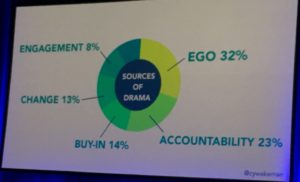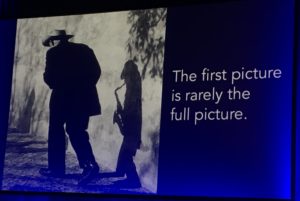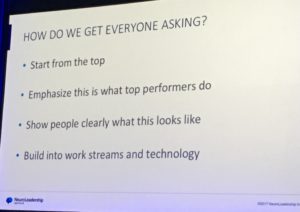On the WorkHuman “pre-conference” day, we heard from Cy Wakeman, Steve Pemberton, and David Rock. There is so much I could share but I am going to focus on one behaviour from each of them that we need to STOP doing at work, and what we need to do instead to make work more human.
Cy Wakeman: Stop using “great” to judge others
Cy Wakeman was one of my favourites at WorkHuman in 2017. Immediately after our session, I kindled her book, Reality-Based Leadership. It’s well worth reading and sharing with your entire team.
Cy talks a lot about judgment and venting and how to escape those ego-based thoughts and behaviours and instead, step up and into self reflection and great behaviour. As she says, we all know what “great” behaviour looks like. The problem is that we use “great” to judge others, which turns into listening to our ego.
I can immediately think of times when I’ve felt, or when other leaders have shared their frustrations about colleagues:
“Gary never gets his part of the project done on time! He is lazy and incompetent. I am the only one around here that is committed to quality!”
Or
“I can’t believe it – Sales is always doing this to us – they just want to sell the product and couldn’t give a $h!t about how we can’t implement what they sell. They don’t really care about the customer. Our team is the only one that really gets it, but sales gets all the glory.”
When someone is in this mode, they are judging others, comparing them to their thought of what “great” look s like. They are listening to their ego, which is narrating our world in the negative. Ego is the biggest source of drama in the workplace, harming productivity and positivity.
s like. They are listening to their ego, which is narrating our world in the negative. Ego is the biggest source of drama in the workplace, harming productivity and positivity.
Instead of using “great” to judge others, we need to use it to reflect on our own behaviour.
This is a powerful technique – one which we use in our leadership development very often. It sounds like:
“Wow, it sounds like Gary must be struggling to keep up and get everything done. How did you help?”
OR
“What can you do to add value?”
OR
“What would “great” look like for you right now?
OR, as we often ask our clients:
“If you were being the leader you want to be, what would you do right now?”
When we STOP using “great” to judge others, and instead, use it to reflect on our own behaviour, we can step up to move the team and the work forward. And trust me… it feels so much better to realize your own power in your situation!
Steve Pemberton: Stop trying to figure out “what” somebody is
Steve Pemberton is now the CHRO at Globoforce, and has a varied background that shows his commitment to learning and growing. He is a very eloquent speaker and great storyteller. He spoke at my first WorkHuman conference in 2016, sharing his story of growing up in the foster system and overcoming adversity, and he had me (and most of the audience) in tears.
This year, Stev e told his story a little differently, sharing some lessons along the way. One of the themes he shared was how people have a tendency to “categorize” people. It’s something the brain does to make sense o the world, and it’s a natural process. The problem is that when you’re doing that, you’re missing out on much of people’s potential.
e told his story a little differently, sharing some lessons along the way. One of the themes he shared was how people have a tendency to “categorize” people. It’s something the brain does to make sense o the world, and it’s a natural process. The problem is that when you’re doing that, you’re missing out on much of people’s potential.
Steve shared the story of a judge in a spelling bee when he was a young boy. Her smile lit up every time he spelled the word correctly. He felt like she cared and didn’t see him as the labels that others tried to put on him.
We need to be less concerned with trying to figure out what somebody is and more concerned with who they are.
When we don’t try to label someone as black, gay, white, straight, etc, we can focus on them as a person. We can see their potential, their brilliance, and we can bring more to the conversation.
David Rock: Stop giving feedback
David Rock is the author of “Your Brain at Work”, which I’m in the middle of reading, so I was excited to hear him speak about the neuroscience of feedback.
After studying the most widely used feedback models and multiple interviews with leaders, Dr Rock found that the way we give feedback in organizations doesn’t works nd that people should receive 10X as much feedback as they currently receive, in order to build high performance.
The problem, he explained, is that when we ask to give someone feedback, they often hear:
Can i criticize your work so I can feel better about myself?
Interestingly, the brain craves feedback, but when someone gives it, unsolicited, the brain sees that as a threat, reacting negatively. Dr Rock shared the SCARF model, which outlines what drives behaviour during social interactions. SCARF stands for Status, Certainty, Autonomy, Relatedness, and Fairness.
When we are given feedback, it threatens our status, makes things uncertain, decreases our autonomy, can affect how we’re relating with the person, and is often seen as unfair. When you realize all of these threats that our brain sees, it’s easy to see why people often react to constructive or critical feedback.
David Rock’s advice:
Stop giving feedback and start asking for it.
I found this interesting. In our leadership development program, feedback conversations are driven by the employee, because we, too, have seen the negative reactions to a manager giving feedback. However, we feel strongly that feedback should be a conversation that happens regularly, as part of a routine of post-project discussions, one-to-one meetings, or ad hoc discussions when someone does something great or that needs improvement. I wondered how you can still ensure feedback happens when needed and regularly.

Several people had questions about how to encourage people, other than high performers, to ask for feedback. Dr Rock’s advice was to start from the top. Show that it is okay to ask for feedback, and helpful to be vulnerable. Modeling the way helps others to see what it looks like and how it works.
if you’ve never been to WorkHuman, and you care about making work better, you are missing out! This is only the first three speakers out of dozens. I can’t wait to learn and share more!

Recent Comments